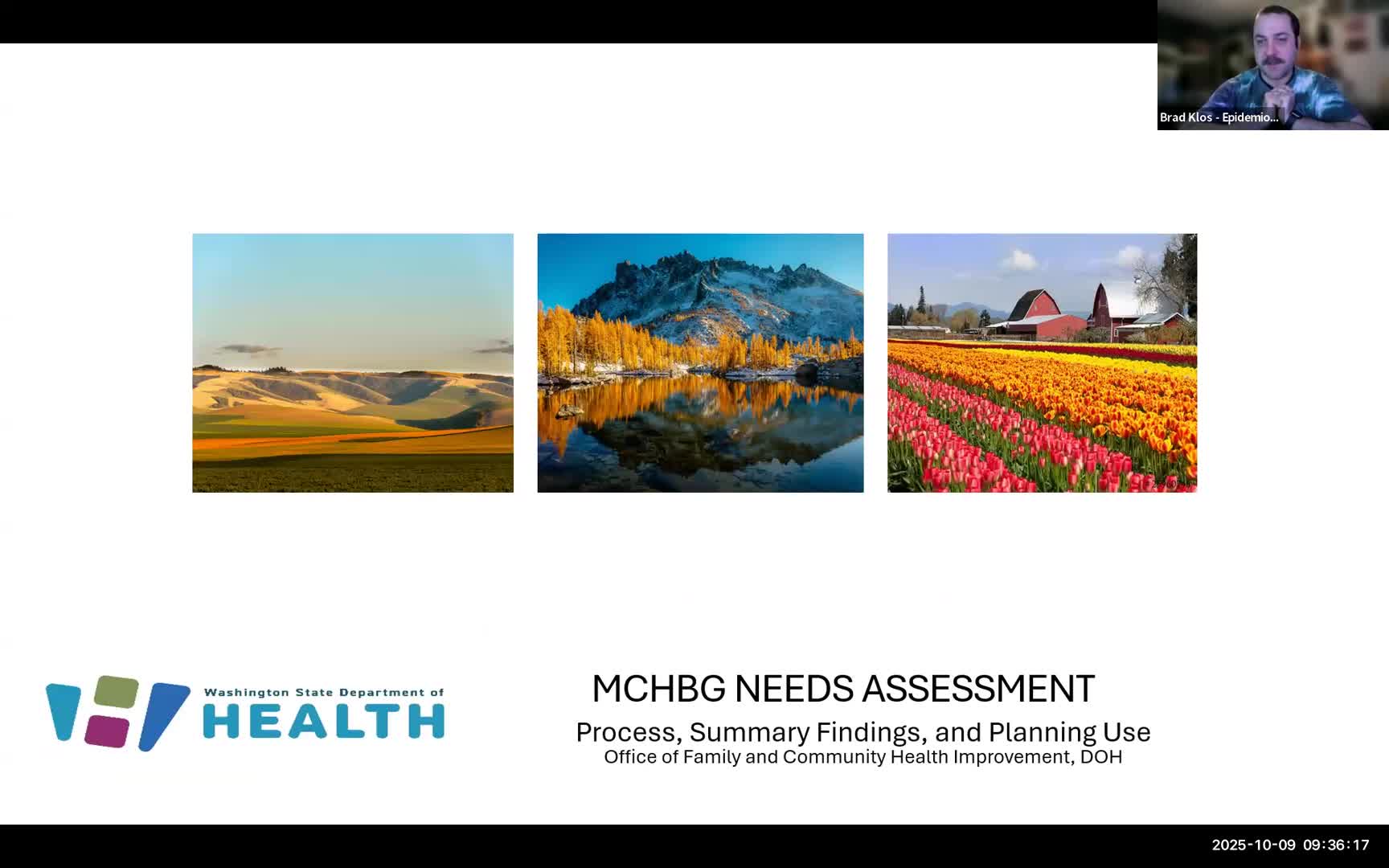DOH needs assessment finds housing, childcare and mental-health supports top priorities for mothers, children and families
Get AI-powered insights, summaries, and transcripts
Subscribe
Summary
The Washington State Department of Health told the Home Visiting Advisory Committee its five-year Maternal and Child Health (Title V) needs assessment found recurring themes — housing affordability, childcare, mental-health services and provider shortages — that will guide the agency’s priorities and performance measures.
Brad Close, a maternal and child health epidemiologist with the Washington State Department of Health, presented findings from the state’s five‑year Maternal and Child Health (Title V) needs assessment to the Home Visiting Advisory Committee. The assessment drew on interviews, local health jurisdiction reports and a wide “discovery” survey to map needs across perinatal, child, adolescent and special‑health‑care‑needs domains.
The assessment collected input from multiple sources and formats, Close said, including key‑informant interviews with local health jurisdictions, partner convenings and a broad discovery survey. “We got over 2,000 responses, and that’s — that’s after we limited it to Washington respondents, who who had something valid to say,” Close said, noting the discovery survey was offered in multiple languages to broaden participation.
Why it matters: Washington’s Title V block grant guides federal and state investments in maternal and child health. Close told the committee the findings will inform a state action plan and performance measures tied to the block grant, and that many of the most common needs identified are upstream social determinants of health that affect access to care.
The report’s most frequent themes, Close said, were housing, health, affordability, childcare and food — words that appeared hundreds of times across documents and responses. Local public‑health partners emphasized mental‑health needs (including youth depression and suicide), “health deserts” with limited access to prenatal and specialty care, and shortages of prenatal providers and pediatric specialists in many counties.
Close highlighted three crosscutting pillars the DOH used to organize priorities: economic security and basic needs; health‑care access and quality; and social‑emotional well‑being and supports for parents and caregivers. In the perinatal domain, the assessment flagged provider shortages, long wait times for mental‑health care and the need for more lactation, doula and community‑health‑worker supports.
“Doula work keeps being promoted to break down silos and support families with positive work experiences, but we don't have infrastructure in place to support local doulas and create a community that's welcoming to them and their work,” Close said, quoting one discovery‑survey respondent.
The assessment also called attention to gaps in services for children and youth with special health‑care needs: families reported limited respite and in‑home supports and difficulties navigating complex systems of care. Local jurisdictions described struggles to provide sustained home‑based supports that make it possible for parents to be parents and not full‑time care coordinators, the presentation said.
DOH staff said the assessment informed a state action plan built around roughly 10 priorities with associated performance measures and activities. Close identified example strategies tied to perinatal supports: breastfeeding and lactation support, newborn outreach and home visiting, family housing assessment, and a longer‑term aspiration for a statewide resource‑and‑referral system that better connects families to services. He noted performance and evaluation measures would monitor progress (examples included hospital use of donor human milk for at‑risk newborns and percent of births occurring at DOH “LIFE”‑certified facilities that support breastfeeding).
On availability and timing, Close said the assessment synthesizes data collected across 2021–2025 with heavier collection in 2023–24 and that DOH is working on a shorter, plain‑language summary for public review: “We will try to get something more, plain speak, understandable out in the next month or two,” he said.
DOH asked the committee to consider how home visiting and other programs can connect to basic‑needs strategies identified in the assessment.
Ending: Committee members asked where to find the full materials and were told a detailed application and multi‑page reports exist; DOH staff said they would circulate concise briefs for each domain and post easier‑to‑read summaries in the coming weeks.
